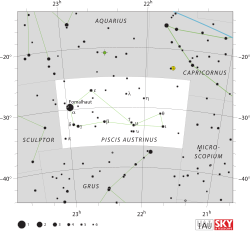Gamma Piscis Austrini
| Gamma Piscis Austrini (γ) | |
 | |
| Observationsdata Epok: J2000.0 | |
|---|---|
| Stjärnbild | Södra fisken |
| Rektascension | 22t 52m 31,53513s[1] |
| Deklination | -32° 52′ 31,8059″[1] |
| Skenbar magnitud () | +4,448[2] (4,59 + 8,20)[3] |
| Stjärntyp | |
| Spektraltyp | A0 Vp(SrCrEu)[4] + F5 V[5] |
| U–B | -0,038[2] |
| B–V | -0,046[2] |
| Astrometri | |
| Radialhastighet () | +16,5 ± 2,7[6] km/s |
| Egenrörelse (µ) | RA: -32,73[1] mas/år Dek.: -21,31[1] mas/år |
| Parallax () | 16,14 ± 0,57[1] |
| Avstånd | 215 ± 8 lå (66 ± 2 pc) |
| Absolut magnitud () | -0,20 / 3,50[5] |
| Detaljer | |
| Massa | 2,63[7] M☉ |
| Radie | 2,63[8] R☉ |
| Luminositet | 79,85[8] L☉ |
| Temperatur | 10 776 ± 366[7] K |
| Vinkelhastighet | 47[7] km/s |
| Ålder | 214[7] miljoner år |
| Andra beteckningar | |
| γ PsA, 22 Piscis Austrini, CD−33° 16270, HD 216336, HIP 112948, HR 8695, SAO 214153, WDS J22525-3253AB[9] | |
Gamma Piscis Austrini (γ Piscis Austrini, förkortat Gamma PsA, γ PsA) som är stjärnans Bayerbeteckning, är en dubbelstjärna[3] belägen i den sydöstra delen av stjärnbilden Södra fisken. Den har en kombinerad skenbar magnitud på 4,45[2] och är synlig för blotta ögat där ljusföroreningar ej förekommer. Baserat på parallaxmätning inom Hipparcosuppdraget på ca 15,1[1] mas, beräknas den befinna sig på ett avstånd på ca 215 ljusår (ca 66 parsek) från solen.
Egenskaper
[redigera | redigera wikitext]Primärstjärnan Gamma Piscis Austrini A är en blå till vit stjärna i huvudserien av spektralklass A0 Vp(SrCrEu)[4]. Den har massa som är ca 2,6[7] gånger större än solens massa, en radie som är ca 2,6[8] gånger större än solens och utsänder från dess fotosfär ca 80[8] gånger mera energi än solen vid en effektiv temperatur av ca 10 800[7] K.
Följeslagaren Gamma Piscis Austrini B är en stjärna i huvudserien av spektralklass F5 V[5] med en skenbar magnitud på 8,20[3]. År 2010 var stjärnparet separerat med 4 bågsekunder vid en positionsvinkel på 255°.[10]
Referenser
[redigera | redigera wikitext]- Den här artikeln är helt eller delvis baserad på material från engelskspråkiga Wikipedia, tidigare version.
Noter
[redigera | redigera wikitext]- ^ [a b c d e f] van Leeuwen, F. (2007), "Validation of the new Hipparcos reduction", Astronomy and Astrophysics, 474 (2): 653–664, arXiv:0708.1752 , Bibcode:2007A&A...474..653V, doi:10.1051/0004-6361:20078357.
- ^ [a b c d] Rakos, K. D.; et al. (February 1982), "Photometric and astrometric observations of close visual binaries", Astronomy and Astrophysics Supplement Series, 47: 221–235, Bibcode:1982A&AS...47..221R.
- ^ [a b c] Eggleton, P. P.; Tokovinin, A. A. (September 2008), "A catalogue of multiplicity among bright stellar systems", Monthly Notices of the Royal Astronomical Society, 389 (2): 869–879, arXiv:0806.2878 , Bibcode:2008MNRAS.389..869E, doi:10.1111/j.1365-2966.2008.13596.x.
- ^ [a b] Abt, Helmut A.; Morrell, Nidia I. (July 1995), "The Relation between Rotational Velocities and Spectral Peculiarities among A-Type Stars", Astrophysical Journal Supplement, 99: 135, Bibcode:1995ApJS...99..135A, doi:10.1086/192182.
- ^ [a b c] Corbally, C. J. (1984), "Close visual binaries. I - MK classifications", Astrophysical Journal Supplement Series, 55: 657, Bibcode:1984ApJS...55..657C, doi:10.1086/190973.
- ^ Gontcharov, G. A. (2006), "Pulkovo Compilation of Radial Velocities for 35 495 Hipparcos stars in a common system", Astronomy Letters, 32 (11): 759, arXiv:1606.08053 , Bibcode:2006AstL...32..759G, doi:10.1134/S1063773706110065.
- ^ [a b c d e f] David, Trevor J.; Hillenbrand, Lynne A. (2015), "The Ages of Early-Type Stars: Strömgren Photometric Methods Calibrated, Validated, Tested, and Applied to Hosts and Prospective Hosts of Directly Imaged Exoplanets", The Astrophysical Journal, 804 (2): 146, arXiv:1501.03154 , Bibcode:2015ApJ...804..146D, doi:10.1088/0004-637X/804/2/146.
- ^ [a b c d] https://www.universeguide.com/star/gammapiscisaustrini, hämtad 2018-08-26.
- ^ "gam PsA -- Double or multiple star", SIMBAD Astronomical Database, Centre de Données astronomiques de Strasbourg, hämtad 2017-05-18.
- ^ Mason, B. D.; et al. (2014), The Washington Visual Double Star Catalog, Bibcode:2001AJ....122.3466M, doi:10.1086/323920.
Externa länkar
[redigera | redigera wikitext]- https://www.universeguide.com/star/gammapiscisaustrini
- stars.astro.illinois.edu/sow/gammapsa.html
